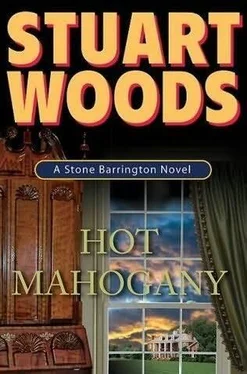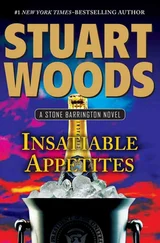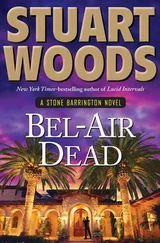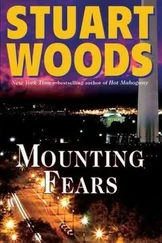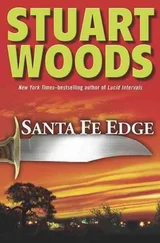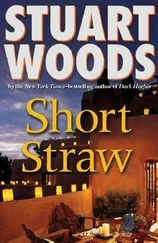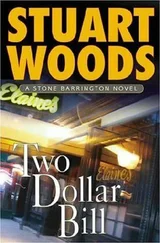Woodman amp; Weld was often referred to as the gold standard of New York law firms, with a reputation for high-quality legal services, solid integrity and complete discretion. Every law firm, however, has clients and cases with whom it would prefer not to be publicly associated, and for that reason W amp;W employed Stone. He and Bill Eggers had been classmates at NYU Law School, and when Stone had been invalided out of the NYPD, Eggers had brought him aboard.
Stone got off the elevator, and the receptionist didn’t even speak, just waved him in the direction of the corner office of the managing partner.
Stone rapped lightly on the door, opened it and stuck his head in. “Good morning?”
“Stone!” Eggers said, rising from his chair. His companion did not rise. “Come in, come in! I want you to meet someone.”
At this, the other man rose. He was of medium height and build, wearing a very good suit but somehow unprepossessing. He was bald, with a fringe of blond hair, and wore rimless spectacles. Stone knew who he was immediately.
“Stone, this is Harlan Deal. Harlan, this is my colleague, Stone Barrington.”
Stone shook Deal’s hand. His grip was firm and cool, but his demeanor was dour. He looked as though he had not slept well for some time. “How do you do, Mr. Deal,” Stone said.
“Hello,” Deal replied. “Please call me Harlan; everybody does.”
What most people called him, Stone reflected, was The Deal. Harlan Deal had inherited a portfolio of grimy real estate in the nether regions of the Bronx and Queens and had turned it into a giant holding company, called Real Deal, with a worldwide reach. It was a great American success story, but Deal, personally, remained low-powered socially. He contributed to good causes, even had his own foundation for that purpose, but he was not high on the dinner-party list of anyone who did not wish to borrow money from him. There were stories of dinner partners who had not heard him speak during a five-course meal.
“Sit down, Stone,” Eggers said. “Harlan has a little problem that I think you might be able to help him with.”
“Well, I’ll certainly try,” Stone replied.
“Heh, heh,” Eggers chortled. “I think you’ll find, Harlan, that Stone’s efforts are of a very high order.”
Stone stared at Eggers. What was he promising this guy? Stone had no clue as to why he was there. “Well, Bill,” he said, “let’s hear about the problem before we start making promises. Perhaps Mr. Deal will tell me about it.”
“Harlan,” Deal replied.
“Of course, Harlan, and please call me Stone.”
“What sort of work do you do, Mr. Barrington?”
“I’m an attorney, of counsel to Woodman and Weld.”
“Of counsel? What does that mean, exactly?”
“I think Bill could explain that better than I.”
Eggers had not been ready for this, but he caught the ball. “Stone is a generalist, where most of our people specialize. That sometimes gives him a better view of the big picture. He is a very, very capable attorney, I assure you.”
“I see,” Deal said, obviously not seeing at all. “And how are you going to help me, Mr. Barrington?”
Stone fixed a benevolent smile on his face. “I’m afraid I won’t be able to help you at all, until you tell me your problem, Mr. Deal.”
“It’s Harlan, please.”
“And please call me Stone.”
“I assure you, Harlan,” Eggers said, “all this will be kept in the closest confidence, under the full force of the attorney-client relationship.”
“I should certainly hope so,” Deal said, but he still made no move to explain his problem. He sighed deeply and finally said, “It’s my wife.”
Stone and Eggers sat silently, hanging on his every word.
“Oh, sorry,” Deal said. “I mean my fiancée. Soon to be my wife.”
“Yes, go on,” Stone said.
“There’s not much to tell,” Deal said.
Stone had that impression. “Perhaps you could tell me the nature of the problem with your fiancée.”
“I hope you understand that this is deeply embarrassing for me,” Deal said.
“Harlan,” Eggers said. “You’re among friends. Please feel free to speak candidly.”
“All right,” Deal said, but then he became silent again, staring out the window of Eggers’s office toward the East River.
Stone and Eggers waited patiently. Stone fought the urge to doze off. He was beginning to understand the reluctance of people who gave dinner parties to invite Harlan Deal.
“Harlan?” Eggers asked, expectantly.
“Yes, Bill?”
“You were about to tell us about the problem with your fiancée.”
“Oh, yes.” But still Deal said nothing.
“Tell me, Harlan,” Stone said, “if I may call you that.”
“Of course. Please call me Harlan, Mr. Barrington.”
“And call me Stone.”
“Of course.”
“Tell me, do you think that your problem with your fiancée might require a legal solution?”
“Well, certainly,” Deal replied. “Why else would I come to my law firm?”
“Of course,” Stone said. “Could you give me some idea of what might be the legal action you consider necessary?”
“Well, I don’t want to sue,” Deal replied. “That would just be all over the papers.”
“ Discretion is the byword in these cases,” Stone said, although he had no idea what cases he was talking about.
“Well,” Harlan said, rising to his feet. “I’m glad you understand, Mr. Barrington.” He offered his hand. “May I say that it has been a real pleasure meeting you.” He shook Stone’s hand warmly, then Eggers’s, then walked out.
Stone turned to Eggers. “Bill, what the fuck was that all about?”
“I apologize for Harlan,” Eggers said. “He has difficulty articulating problems that are not related to his business.”
“You seem to be having difficulty articulating, too, Bill. What is the problem ?”
“The young lady won’t sign the prenup,” Eggers said.
Stone sank into a chair. “Bill, how the hell am I supposed to get a woman to sign a prenup she has already declined to sign?”
Eggers leaned across his desk and handed Stone a two-page document. “Read it. I wrote it myself.”
Stone scanned the agreement. “She gets an allowance of half a million dollars a year, adjusted annually for inflation, and if she leaves him, she gets a million dollars for every year they’ve been married, calculated to the nearest month?”
“Not bad, huh?”
“Not bad, if she’s considering it as employment. Not good, if we’re talking about Harlan Deal’s very large fortune.”
“Stone,” Eggers said, “a good prenup should accomplish two things: one, insure the financial welfare of the wife in the event that the husband changes his mind about how beautiful and sexy she is, and two, prevent an avaricious woman from looting the husband’s fortune when she decides she can be just as rich divorced as married. I think this document satisfies both those requirements.”
“Well, this certainly accomplishes the second, but there’s nothing in here about housing after a divorce. She’s not going to be able to buy a nice apartment in New York – I’m assuming we’re talking New York – on a stipend of a million a year.”
“Good point. I think I can get Harlan to kick in, say, two million for an apartment.”
“Make it three million; you can’t get much for two these days.”
“All right.”
“Does the lady have any children?”
“Not that I’m aware of.”
“Is she young enough to get pregnant, assuming Harlan is fertile enough to get her that way? If we don’t make provision for possible children, and she has some, it will never stand up in court.”
Читать дальше
